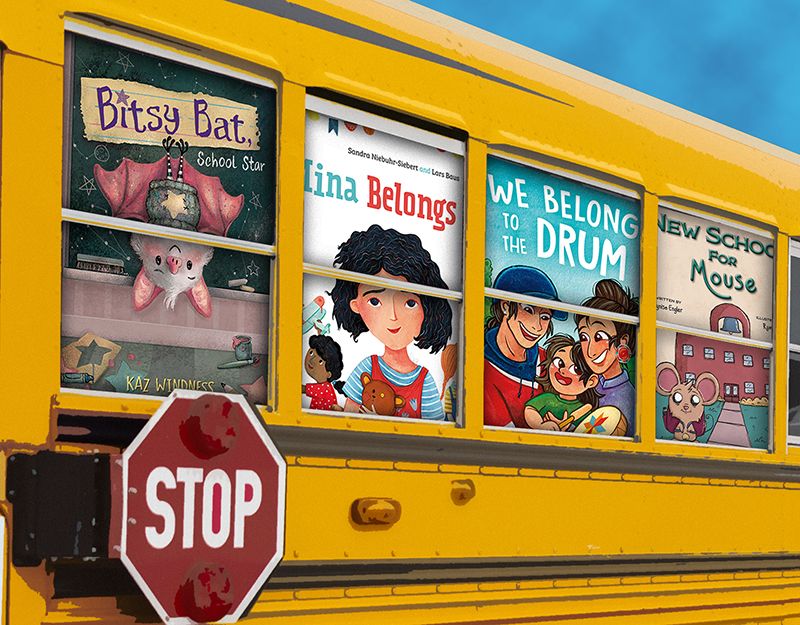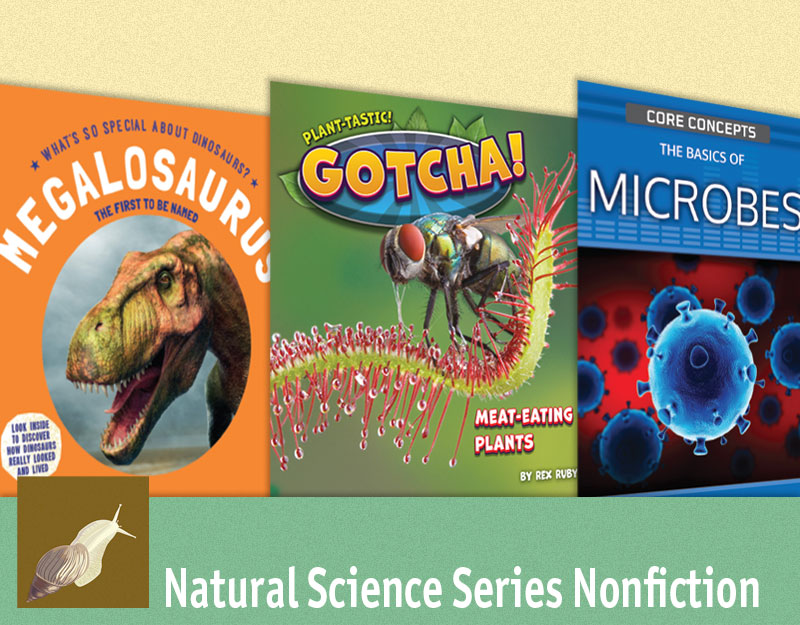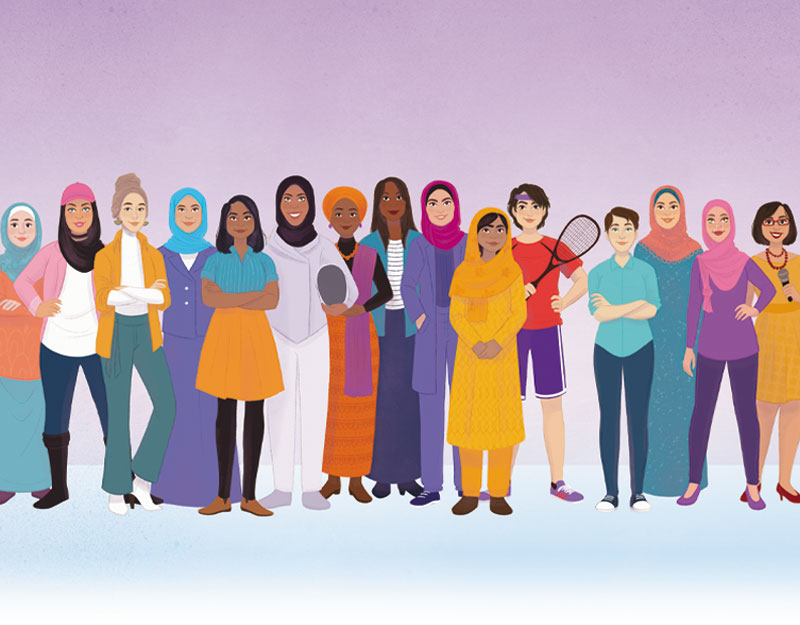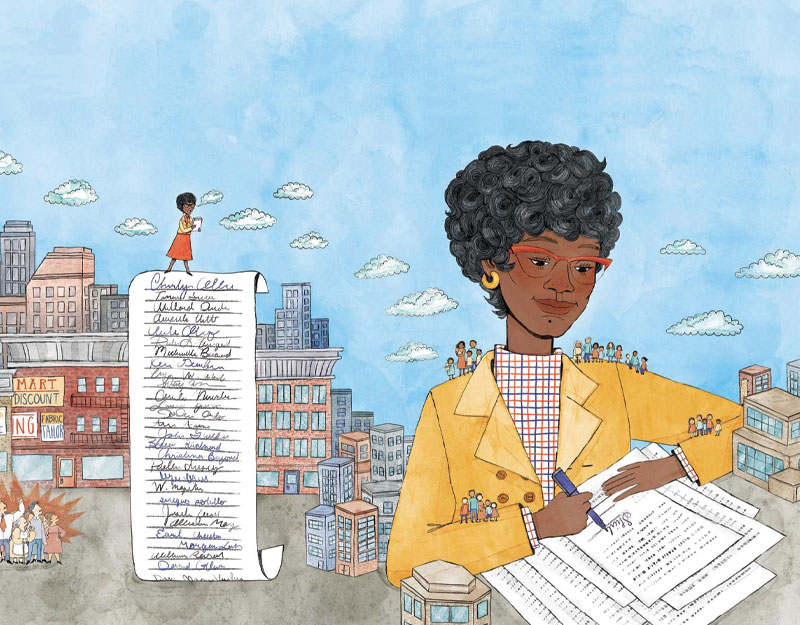Why I Write Middle Grade with Grownups in Mind, too, a guest post by Emily Barth Isler
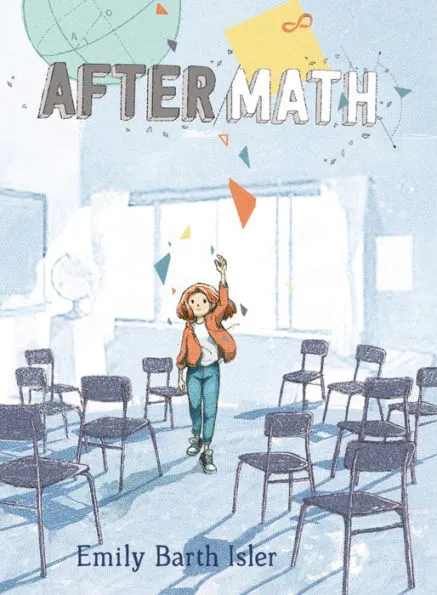
When I tell people I’ve written a book, they are often very excited to hear about it. When I explain it’s a middle grade novel, that enthusiasm generally deflates in an instant (if the person is not an educator, parent, or caretaker of a middle grade reader). For all the excitement around adults who read YA and teens who read books about forty-something divorcees, there’s little cultural conversation around middle grade fiction being applicable– and even helpful– outside of its “intended” audience.
I put intended in quotes because, as many middle grade authors do, I write my books with parents, educators, healthcare providers, and librarians in mind. I’m not just writing the books I wish I’d had when I was a kid, but I’m also writing about the topics I wish people talked about more, the topics parents tell me they don’t know how to bring up, and the things kids tell me their parents or teachers avoid — the uncomfortable things.
ADVERTISEMENT
ADVERTISEMENT
Getting comfortable with discomfort is a lifelong lesson we’re all working on, and nowhere is this more explored than in the tween years and the middle grade books about them. Just because the main characters of a book are middle grade age doesn’t mean older people can’t get something from the story– especially if that reader is an adult who cares for or teaches kids that age.
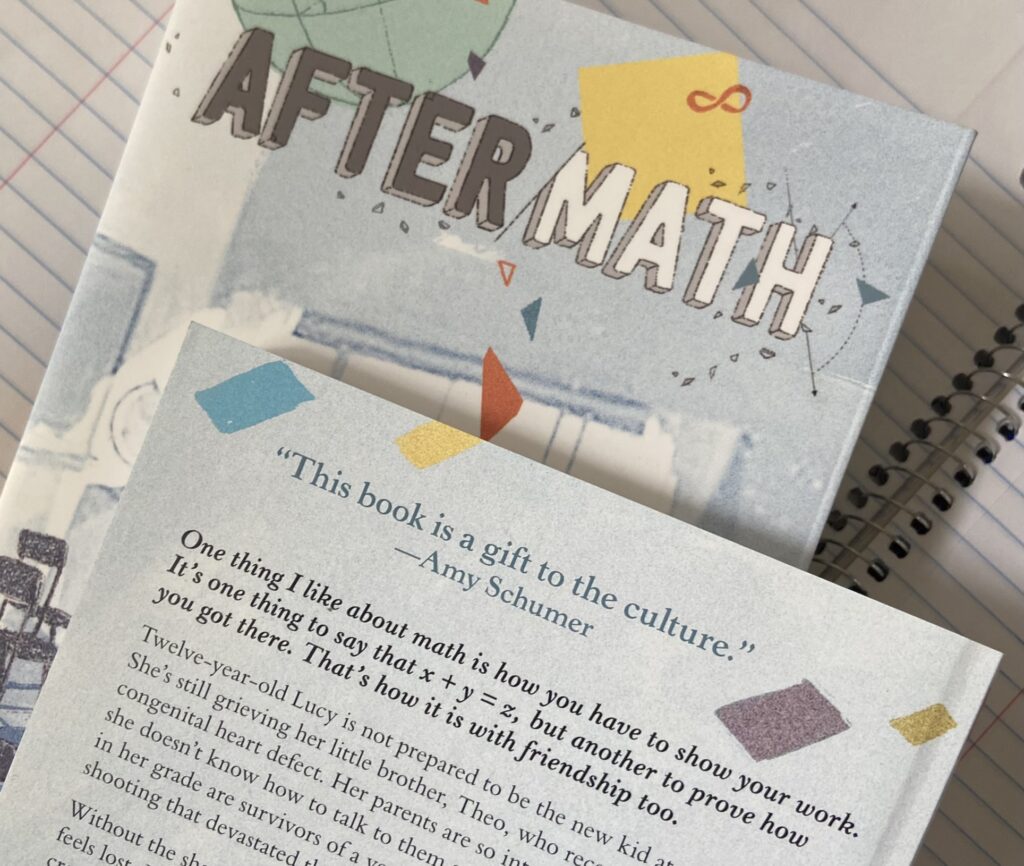
I’m the first person to tell you that my debut novel, AfterMath, isn’t the book you hand to your ten-year-old at the beach and say, “have fun reading!,” never to follow up again about it. Those kinds of books are awesome and necessary and important, but AfterMath isn’t one of them. AfterMath is meant to be read in a group or pair– a classroom, a book club, a parent-child discussion context, or as recommended by a librarian. One pediatrician I talked to even suggested a family book club, an idea I hope spreads in popularity for all kinds of books!
“AfterMath dissects the hearts and minds of children in the wake of unspeakable tragedy, revealing the depths of their compassion and plasticity… [T]his book shows us how wonderful this world could be if adults could learn to talk less, and listen more to the brilliance emanating from our children. Perfect for family book club with your middle schooler!”
-Omkar Karthikeyan, MD
Pediatrician and gun-sense advocate
Today’s kids are often comfortable talking about things that are considered “taboo” by many adults and have a level of comfort with subjects that adults try to gate-keep. Kids recognize that fear is often a signal that something is important. If we’re scared of something, we need to talk about it, write about it, read about it– maybe do something about it.
A few days after the tragic school shooting in Uvalde, Texas in May of 2022, I had a long-scheduled author visit over zoom with a classroom of student fiction writers from Westchester County, New York. We talked about how writing about hard things can be cathartic for the writer as well as for the reader, and how books allow people to develop empathy, that their words can enable others to feel less alone.
Naturally, the topic of Uvalde came up almost immediately during our conversation. As someone who wrote a book about life after a school shooting, I’ve gotten used to getting texts and phone calls from friends and colleagues after gun violence incidents, eager to lament or discuss the atrocities with someone they know is always thinking about it. Yet, I was still surprised by the experiences of these students regarding the tragedy in Uvalde.
Some expressed frustration that their parents didn’t talk to them about it. Others mentioned the moment of silence in school the next day and their gratitude that their teachers didn’t ignore the thing on everyone’s minds. One student even said that, because she doesn’t have a smartphone, she was unaware of the shooting until that moment of silence at school the next day, and felt completely shocked and blindsided that everyone else already knew.
Overall, they kept telling me, “we know all about it, we see the news!” yet simultaneously explaining that many of the adults in their lives didn’t bring it up or want to talk about the shooting. The kids felt alone, in the dark, and without resources.

I don’t blame those adults in their lives that didn’t talk about it. No one wants to tell a kid they love that they might not be safe at school, or out in the world. No one wants to “go there” in their mind, to deal with the scary, horrible things that *might* happen.
But the kids do. They want to go there because they’re often already there. As they told me, they know what’s going on in the world. And we, their parents, teachers, caregivers, and educators, have to learn how to get there with them.
Books are excellent conversation starters. They are an organic, low-pressure, no-spotlight way to start a conversation with a kid in your life. You don’t have to read the book out loud to them, or even read it at the same time, but being available for a conversation after you’ve both read something is priceless.
As Dr. Karthikeyan said, above, you don’t even have to know what to say– it’s okay to just be there and listen to a kid who wants to talk, or to sit together in the silent knowledge that you’re both thinking about the same, hard things.
Towards the end of AfterMath, I wrote a scene where the main character’s mother admits that she is figuring out how to parent her living child after the death of her other child. “Oh, honey,” Lucy’s mother tells her, “I don’t want to scare you, but no one has anything all figured out. We are all always doing everything for the first time. I may be a grown-up, but I’m the mom of a twelve-year-old for the first time. A forty-four-year-old woman for the first time. You know what I mean?”
I wrote that part of the book in hopes that kids– my own children, included– will read it and see that adults aren’t perfect, that we’re making things up as we go along, making plenty of mistakes and trying to be honest with ourselves and with the kids in our lives as things in the world evolve and unfold rapidly. I also hope that it resonates with adult readers, reminding them that we’re all in this together as we stumble towards a better world and the ways to care for kids as we go.
I love to remind readers and students that I am not a therapist or mental health professional! I am a parent who wrote a book, based on things I’ve researched, experienced, and observed. I’m not an expert, and if I had all the answers to things like gun violence or talking about hard things, I would certainly have shared the solutions already! But what I can offer is a conversation starter. And sometimes, the people who need the nudge are the adults, even more so than the kids.
Read a book with your kids. It doesn’t have to be AfterMath, but as we start up another school year, following one filled with record-setting gun violence in America,* I hope the book helps kids and the grownups who love and care for them find a way to talk about the hard things on our minds.
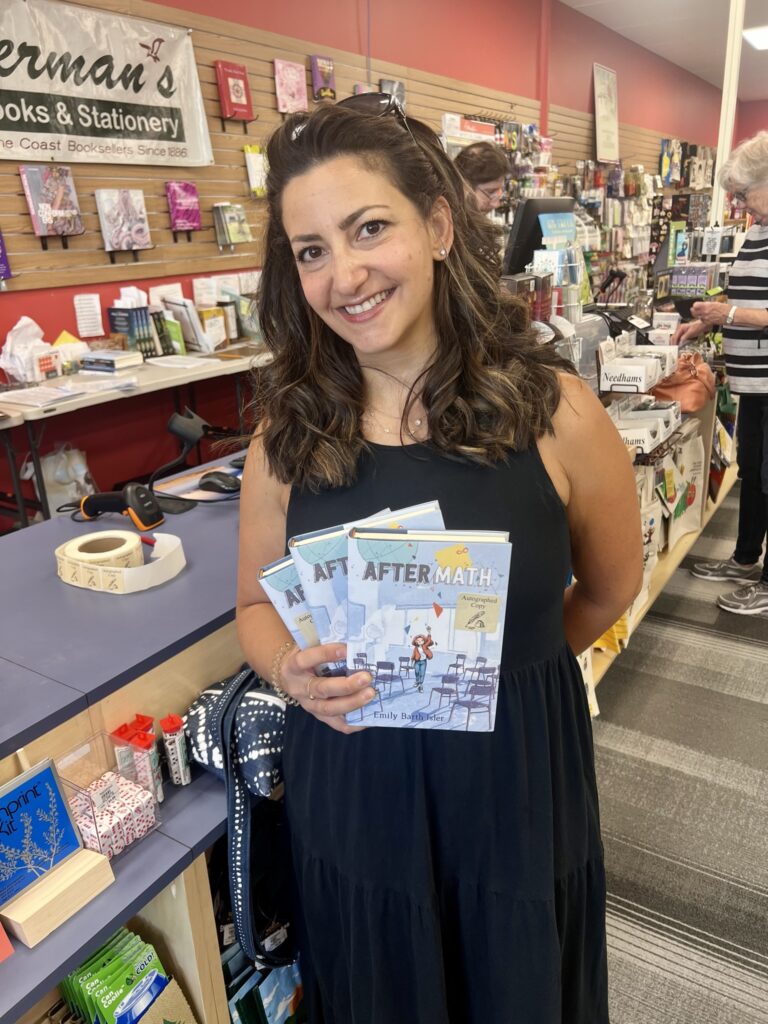
and
https://www.instagram.com/p/ChpYMDzuI-k/
Meet the author

ADVERTISEMENT
ADVERTISEMENT
Emily Barth Isler is the author of AfterMath, an award-winning middle grade novel about grief, resilience, friendship, math, and mime. Activist and comedian Amy Schumer calls the book “a gift to the culture.” Emily lives in Los Angeles, California, with her husband and their two kids. A former child actress, she performed all over the world in theatre, film, and TV. In addition to books, Emily writes about sustainable, eco-friendly beauty and skincare, and has also written web sitcoms, parenting columns, and personal essays. She has a B.A. in Film Studies from Wesleyan University, and really, really loves television. Find her at www.emilybarthisler.com
https://www.instagram.com/emilybarthisler/
About AfterMath
One thing I like about math is how you have to show your work. It’s one thing to say that x + y = z, but another to prove how you got there. That’s how it is with friendship too.
Twelve-year-old Lucy is not prepared to be the new kid at school. She’s still grieving her little brother, Theo, who recently died from a congenital heart defect. Her parents are so intent on a “fresh start” that she doesn’t know how to talk to them anymore. And the other kids in her grade are survivors of a very different kind of tragedy: a school shooting that devastated their small town four years ago.
Without the shared past that both unites and divides her classmates, Lucy feels lost. Even her love of math doesn’t offer the absolute answers she craves. But when an after-school mime class gives her a chance to forge new kinds of connections, Lucy finds that while grief can take many shapes and sadness may feel infinite, love is just as powerful.
ISBN-13: 9781541599116
Publisher: Lerner Publishing Group
Publication date: 09/07/2021
Age Range: 10 – 11 Years
Filed under: Guest Post
About Amanda MacGregor
Amanda MacGregor works in an elementary library, loves dogs, and can be found on Twitter @CiteSomething.
ADVERTISEMENT
ADVERTISEMENT
SLJ Blog Network
Name That LEGO Book Cover! (#53)
Cover Reveal and Q&A: The One and Only Googoosh with Azadeh Westergaard
K is in Trouble | Review
Fighting Public School Book Bans with the Civil Rights Act
ADVERTISEMENT



